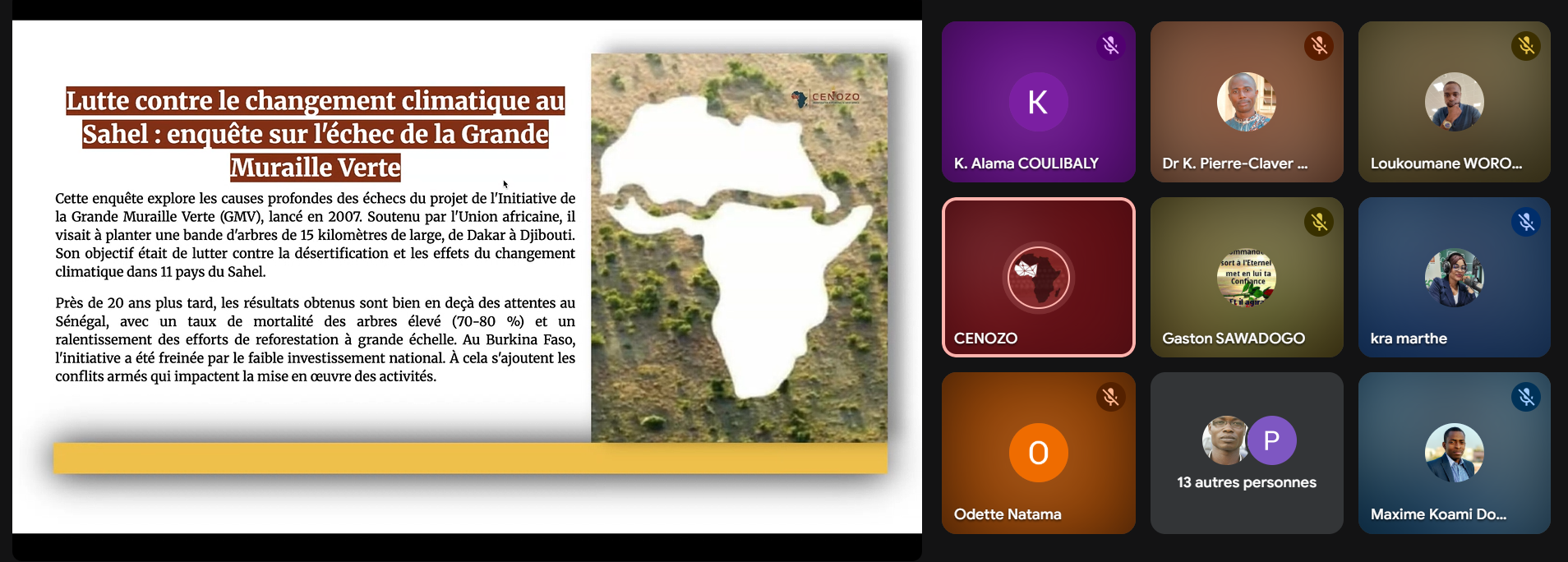OCRI fellows in Francophone Africa share experiences with climate experts
CENOZO, CIJ’s partner for the implementation of OCRI in West Africa, brought together 24 stakeholders online on 27 August to discuss the experiences gained during the third phase of the OCRI project in the region.
Journalists, climate activists, NGO representatives, and university researchers from various sub-Saharan African countries (Côte d’Ivoire, Burkina Faso, Togo, Benin, Cameroon, and the Democratic Republic of Congo) discussed the results of a series of cross-border investigations addressing different aspects of the climate crisis.
Ignace Sossou, programme manager at CENOZO, began by outlining the context and objectives of the project, which has strengthened the capacities of twelve journalists from eight countries, provided twelve grants that have resulted in the production of four transnational investigations, and stimulated networking between journalists and climate experts.
Sossou later presented the four different investigations that had been completed and published. One revealed the reasons for the failure of the Great Green Wall, an ambitious Pan African project aimed at restoring degraded land, along a 15 km strip from Senegal on the west coast of Africa to Djibouti on the east coast. Another story looked at how sand and granite, which play a role in carbon sequestration, are being exploited in an unregulated and devastating manner in West Africa, particularly in Benin, Togo, and Guinea. A third focused on strategic infrastructure in Burkina Faso and Cameroon in the era of climate change and how a decade of neglect has made it vulnerable. The fourth highlighted how mangroves are under severe pressure, in Togo from uncontrolled livestock transhumance, and in the DRC from flaring by an oil company.

Online presentation of the stories
Reporters and various experts exchanged experiences on the challenges of accessing climate data in the region and the importance of cross-border collaboration in investigating different aspects of the climate, which knows no borders.
“Starting with training really helped us improve our open source research skills,” said Jean-Charles Biyo’o, a reporter from Cameroon. The importance of mentoring was also discussed, as it compensates for the gaps left by the capacity limitations of reporters and tools. ‘Some tools do not recognise our countries,’ pointed out Sarah Mangaza, a fellow from the Democratic Republic of Congo (DRC).
In terms of reliable data sources, experts such as Coulibaly Alama from Côte d’Ivoire suggested that journalists look to data collected by institutions like meteorological services. At the same time, Diakité Abdramane from Guinea invited journalists to target documents such as National Communications on Climate Change and Nationally Determined Contributions (NDCs), which are reliable sources of data that member countries of the United Nations Framework Convention on Climate Change (UNFCCC) are required to produce and make public.
The activity wrapped up implementation in Francophone Africa which commenced in April 2024 and featured a one-day regional forum on the collection and use of climate data for investigative reports, a four-day investigative story-lab training workshop and post-workshop support to selected journalists for the execution of cross-border stories.
